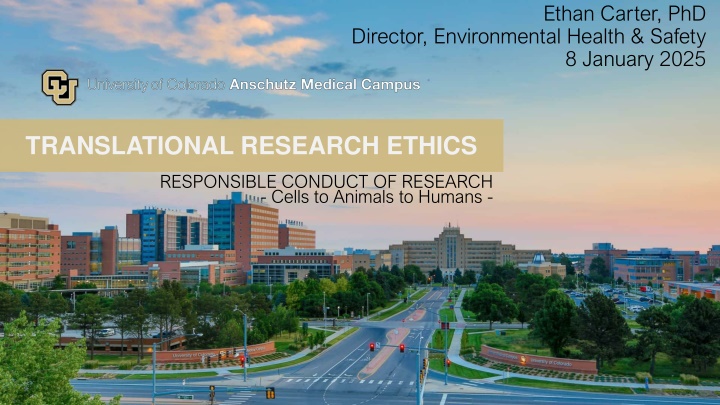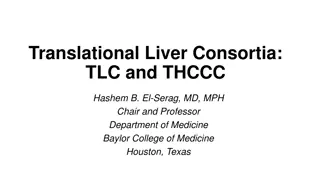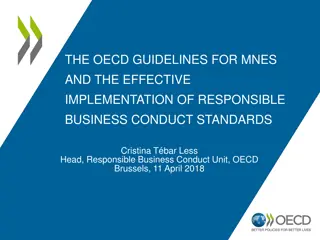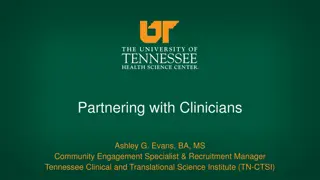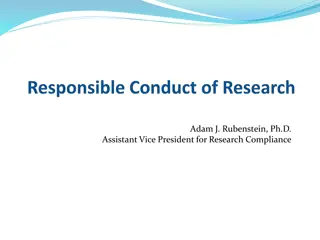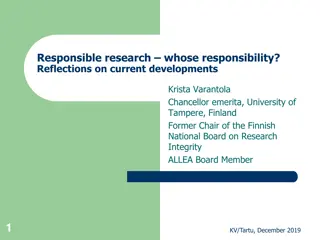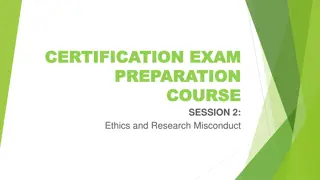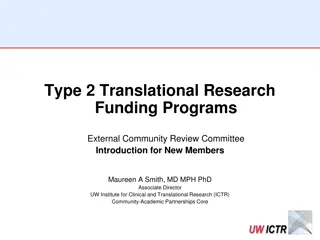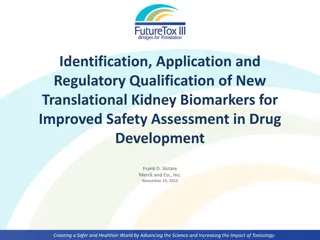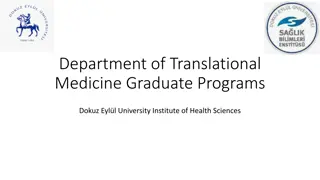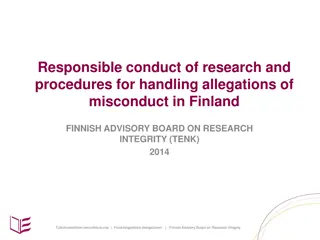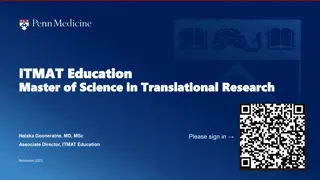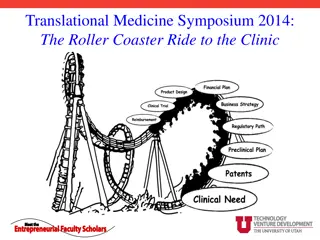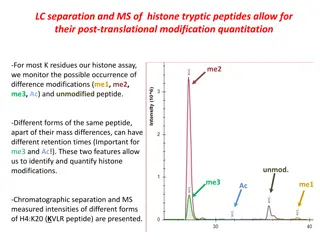Responsible Conduct of Research in Translational Studies
Translational research in biomedicine raises ethical dilemmas regarding conflicts of interest, stem cell interventions, and genetic findings disclosure. It's crucial to address these issues while upholding scientific integrity, participant protection, and public trust. Various case studies, decision trees, and institutional resources guide researchers through navigating translational research complexities.
Download Presentation

Please find below an Image/Link to download the presentation.
The content on the website is provided AS IS for your information and personal use only. It may not be sold, licensed, or shared on other websites without obtaining consent from the author.If you encounter any issues during the download, it is possible that the publisher has removed the file from their server.
You are allowed to download the files provided on this website for personal or commercial use, subject to the condition that they are used lawfully. All files are the property of their respective owners.
The content on the website is provided AS IS for your information and personal use only. It may not be sold, licensed, or shared on other websites without obtaining consent from the author.
E N D
Presentation Transcript
Ethan Carter, PhD Director, Environmental Health & Safety 8 January 2025 TRANSLATIONAL RESEARCH ETHICS RESPONSIBLE CONDUCT OF RESEARCH - Cells to Animals to Humans - TRANSLATIONAL RESEARCH
Silence personal devices. Stay muted when not talking. Set up in a quiet location. Remain attentive. Avoid checking email/phone/web. Use the Chat function to ask questions or get technical help. Use your full name, not an alias. Expectations Receiving credit for attendance: To satisfy the NIH Requirement for Instruction in the Responsible Conduct of Research, the following are required to receive credit for attendance: Attend the full 90 minutes of the training. Attending any 8 out of the 9 RCR seminars we offer will satisfy the NIH requirement. Keep your video camera on throughout the session. NIH requirements for RCR training specify face-to-face discussion. Participate interactively throughout the session. Engage in discussion through the chat, come off mute, or raise your hand. TRANSLATIONAL RESEARCH
Objectives & Agenda By default, nearly all research being conducted at the Anschutz Medical Campus is translational. Agenda Definitions Framing the problem Case studies Decision Trees Institutional Resources TRANSLATIONAL RESEARCH
Translational research poses ethical dilemmas "I am the principal investigator for a clinical trial and would like to recruit subjects for this study from my practice. What precautions need to be taken to address potential conflicts of interest? "What are the potential ethical issues associated with putting a human neuronal stem cell into the brain of a developing mouse embryo? "I have completed a study looking at genetic variants associated with coronary artery disease. These variants are not routinely evaluated by cardiologists but may impact the health of volunteers in my study. Should I share these findings with my research subjects and, if so, what's the best way to contact them?" TRANSLATIONAL RESEARCH
Why is RCR Important in Translational Research? Regulations and compliance are critical, but more challenging are the ethical principles and practices when conducting translational research. When bridging the gap between basic science discoveries and their application in clinical practice, the safety and well-being of research participants while upholding scientific integrity throughout the process is essential. Key Objectives Maintaining public trust: Maintaining public trust in research by ensuring ethical practices and transparent reporting of results. Upholding scientific validity: Upholding rigorous research methods to produce reliable and meaningful results. Participant protection: Minimizing potential risks and maximizing benefits for research participants. TRANSLATIONAL RESEARCH
Know the ground rules, Know what you are getting into With respect to translational research . It is important to understand what you are getting into translational research is governed by: Regulations & compliance Ethical & philosophical mores TRANSLATIONAL RESEARCH
What is Translational Research? The purpose of translational research is to test, in humans, novel therapeutics strategies developed through basic research and experimentation TranslationalResearch This is the foundation of the NIH s Bench-to- Bedside Awards which encourage the collaboration between clinicians and basic scientists. NIH launched the Clinical and Translational Science Award (CTSA) Consortium in 2006. Our institution has been a CTSA awardee since 2008. Translational research can occur in these formal, structured environments or in informal collaborations TRANSLATIONAL RESEARCH
CTSA Objectives Speed discoveries to improved patient care.. Develop a distinct discipline for clinical and translational science at institutions Provide opportunities and resources for original research on novel methods Develop translational technologies and a knowledge base for the full spectrum of clinical and translational science Synergize partnerships with industry, foundations, and community physicians Train the interdisciplinary teams who will conduct the clinical and translational research of the future TRANSLATIONAL RESEARCH
Why Conduct Translational Research? 1. Complexity. Basic mechanisms of disease must be studied in more simple forms cells and animals. 2. Expertise. No one person or research group possesses all of the skills required. 3. Safety. Novel modalities must be tested safely before being used in humans. 4. Efficiency. Well-coordinated translational research can conserve resources and speed the delivery of treatments and cures to human disease. TRANSLATIONAL RESEARCH
Translational research as an RCR topic? The foundation of translational research is to foster and promote multi-investigator and multi-institutional collaboration and sharing. Multiple methods and technologies are used. Numerous federal regulations, institutional policies and best practices govern cell, animal, and human research. Federal regulations CFRs FDA regulations HHS privacy (HIPAA) Export controls & shipping Conflict of Interest (COI) NIH Grants Policy Inter-entity material transfer agreement Institutional oversight cmte s Industry agreements TRANSLATIONAL RESEARCH
Translational Research & Compliance Institutional Oversight of Translational Research 1. Colorado Multi-Institutional Review Board (COMIRB) reviews all human subjects research 2. Radiological Safety Committees review all research using radiological materials 3. Institutional Animal Care and Use Committee (IACUC) reviews all research using animals 4. Institutional Biosafety Committee reviews all research using rDNA, Select Agents, Dual- use Research and infectious material 5. Department of Environmental Health and Safety 6. Office of Regulatory Compliance oversees DURC, EC, COI and HIPAA compliance; Clinical Research Support Center (CRSC) 7. Clinical Research Administration Office (CRAO) oversees the protection of intellectual property and material transfer agreements (MTAs) 8. Colorado Clinical & Translational Sciences Institute (CCTSI) has a Regulatory Knowledge & Support Core (RKSC) TRANSLATIONAL RESEARCH
Translational Research & Compliance Review of several scenarios and hypothetical case studies that represent commonly occurring situations in translational research Reminder: To participate in discussions, raise your hand. Click Participants at the bottom of your screen. Click Raise Hand (click Lower Hand when done). Sign the Attendance Sheet now by clicking the link in the Chat. TRANSLATIONAL RESEARCH
Research Considerations Translational research could include situations where a researcher faces ethical dilemmas related to transitioning findings from basic science to clinical trials, such as: (1) conflicts of interest arising from industry collaborations, (2) issues with informed consent in patient recruitment, (3) data manipulation to achieve desired results, (4) concerns about sharing preliminary data with potential funders, or (5) navigating authorship disputes when transitioning between different research phases; all while ensuring the integrity of the research process and prioritizing patient well-being throughout the translation process. TRANSLATIONAL RESEARCH
Data manipulation pressure: Specific scenario examples: A research team discovers unexpected negative results in a late-stage clinical trial but feels pressure from the funding agency to manipulate the data to present a more positive outcome. How should they navigate this situation while upholding ethical research practices? Industry collaboration conflict: A researcher developing a promising new cancer treatment receives significant funding from a pharmaceutical company with a vested interest in the drug's success. How should they balance the need to maintain scientific integrity with the pressure to generate positive results for the company? Early data sharing with funders: A researcher is considering sharing promising preliminary data from a translational research project with potential funders before the research is fully validated. What are the potential ethical concerns associated with early data dissemination? Patient recruitment challenges: A clinical trial is struggling to recruit patients from diverse backgrounds, potentially impacting the generalizability of the study results. What ethical considerations should the researchers take into account when attempting to address this recruitment gap? Authorship disputes: A team transitioning from pre-clinical to clinical trials faces a disagreement about authorship contributions, with some members from the initial basic science team feeling their work is not adequately recognized in the clinical trial publications. How should the team address this issue fairly? TRANSLATIONAL RESEARCH
Key ethical considerations in translational research: Conflict of interest management: Informed consent: Disclosing and appropriately managing any potential conflicts of interest related to industry collaborations or financial incentives. Ensuring patients fully understand the risks and benefits of participating in a clinical trial and have the ability to withdraw at any time. Scientific rigor: Patient privacy: Protecting patient data and maintaining confidentiality throughout the research process. Adhering to established research methodologies and data analysis practices to ensure reliable and reproducible results. Benefit-risk analysis: Carefully weighing the potential benefits of a new treatment against the risks to patients. TRANSLATIONAL RESEARCH
Scenario #1 You are the PI of an industry-sponsored trial investigating the effectiveness of several new drugs in mitigating tumor growth. CU Anschutz is a high-enrolling site of this multi-center trail. Published work in mice (from the study sponsor) demonstrates that all of the treatment drugs were equally effective in tumor shrinkage and survival. After 6 months of accrual, with initial results coming in you notice that your results differ from those of the sponsor. What do you do? What are your options? TRANSLATIONAL RESEARCH
Scenario #1 - Discussion Do you publish your results locally? At CU Anschutz, our industry-sponsored contracts have a provision for PIs to publish their local results. How will publishing the results locally, basically splitting off from the sponsor s original intent affect your career and relationship with the sponsor? What about staying silent? Will that cause you moral injury? Reference: https://www.ucsf.edu/news/2000/10/97405/ucsf-harvard-team- publishes-major-hiv-therapy-study-over-objections-sponsor TRANSLATIONAL RESEARCH
Scenario #2 You are conducting SARS-CoV-2 / COVID-19 diagnostic testing on symptomatic people using the nasal pharyngeal swab (NPS) collection method. A colleague has been working on a COVID-19 detection method using saliva and asks you if you can have the patients spit into a collection cup during their testing so that she can determine if she can detect a viral load and compare it to your NPS sample results. What, if anything, needs to be done for you add this collection method to your test? TRANSLATIONAL RESEARCH
Scenario #2 - Discussion A revised informed consent may be required. It is possible that this extra collection can be readily done under the auspices of Quality Improvement (QI) If a method, such as the saliva method in the early days of the epidemic is not FDA approved for the detection of SARS-CoV-2 and diagnosis of COVID-19, therefore the results from the saliva test can not be shared with the patient or published. TRANSLATIONAL RESEARCH
Scenario #3 You have an approved IACUC protocol to investigate cardiovascular function in aging rats. Five drugs were approved for use in this protocol. A clinical colleague, who has had very interesting observations in some of her patients using a different FDA-approved drug, approaches you about treating your rats with what she has used. What, if anything, needs to be done for you to treat your rats with this drug and give your colleague the hearts and aortas from these rats? TRANSLATIONAL RESEARCH
Scenario #3 - Discussion If the goals of the colleague s work are the same as your own, you must file an IACUC amendment requesting to add this additional drug to your protocol. No work can begin until this protocol is approved. If the colleague s goals are distinctly different, she will have to submit her own protocol for review. No work can begin until this protocol is approved. What if your colleague just needs the untreated tissue for controls? TRANSLATIONAL RESEARCH
Scenario #4 A colleague at University of Iowa developed a novel monoclonal antibody and has agreed to share this with you. You want to use this antibody to evaluate protein expression and localization in macrophages you have collected from bronchiol-alveolar lavage fluid from patients. What, if anything, needs to be done for you to receive this probe and use it in your studies? TRANSLATIONAL RESEARCH
Scenario #4 - Discussion Because the antibody is the intellectual property of the University of Iowa investigator, a Material Transfer Agreement (MTA) will need to be executed between the two institutions. If the gene and protein of interest in the macrophages was previously covered in the informed consent with COMIRB, no additional action is needed. If not, COMIRB should be contacted. In general, our institutional policy is that an MTA must be executed for the exchange of ALL scientific material with external entities. TRANSLATIONAL RESEARCH
Scenario #5 You have purchased a stock of kidney (MDCK) cells from American Type Cell Culture (ATCC). In addition to experiments on untransfected cells, you will also be transfecting these cells with various sodium channel constructs. Your colleague across the bench would like a couple of plates of these cells to conduct their own, unrelated research. What, if anything, needs to be done for you to give him several plates of cells? TRANSLATIONAL RESEARCH
Scenario #5 - Discussion Per our Institutional Materials Transfer Agreement (MTA) with ATCC, material purchased from ATCC may only be used by the purchaser. Exception: Transfer of material is authorized if the collaborator is doing work directly tied to the original purchaser s project. TRANSLATIONAL RESEARCH
Scenario #6 You are interested in studying the pathogenicity of the influenza and SARS-CoV-2 viruses, to include exploring the mechanisms that could enhance human to human transmission. Published work from University of Florida and Beijing University indicate possible collaborators on this project. You have secured space in our BSL-3 lab for this work. What, if anything, should be your considerations for this work? TRANSLATIONAL RESEARCH
Scenario #6 - Discussion Research involving the manipulation or enhancement of the pathogenicity of infectious agents may fall under federal Dual Use Research of Concern (DURC). DURC regulations include a variety of other areas, as well. In addition to DURC, shipping material such as high path influenza also falls under new federal regulations pertaining to Export Controls . Finally, if biological materials will be shipped between collaborating institutions FAA/IATA shipping training must be taken by the shipper. TRANSLATIONAL RESEARCH
RCR Decision Trees Several decision trees will be placed on the RCR website 1. Overall Translational Research 2. Cellular Research 3. Animal Research 4. Human Subjects Research 5. Bio-Banking https://research.cuanschutz.edu/EHS TRANSLATIONAL RESEARCH
Summary o Translational research can be a formal or informal process. o Translational research is complicated with a multitude of compliance decision points. o Safely and ethically navigating translational research is both a regulatory challenge and a moral and ethical challenge. o Numerous institutional resources exist to facilitate the research and collaboration. TRANSLATIONAL RESEARCH
Institutional Resources Office of the Vice Chancellor for Research Other Departments/Resources 1. Clinical Research Administration Office crao_contracts@ucdenver.edu 303-724-1111 Office of Regulatory Compliance AVC Alison Lakin, PhD Environmental Health & Safety Ethan Carter, PhD, Director Office of Research Committee Support (ORCS) IACUC, IBC, Radiation Safety Mark Douse, PhD, Director Office of Laboratory Animal Resources (OLAR) AVC Jori Leszczynski, DVM, Institutional veterinarian Colorado Multi-Institution Review Board (COMIRB) John Heldens, Director Dual Use Research of Concern and Export Controls Christine Ahearn, JD Office of Grants & Contracts AVC Amy Gannon 2. CCTSI https://cctsi.cuanschutz.edu/ TRANSLATIONAL RESEARCH
Resources If you have questions about RCR, email ClinicalResearchSupportCenter@ucdenver.edu Documentation: Certificates of completion are sent out at the end of the academic year, for each person who has attended and signed-in for at least 8 of the 9 sessions. A Course Evaluation survey will be sent to you after the session. Complete the 3-minute anonymous survey so we can best understand your experience and improve future courses. Slides are available on our website. Scan the QR code and scroll towards the bottom of the page to the "Course Content" section. TRANSLATIONAL RESEARCH
